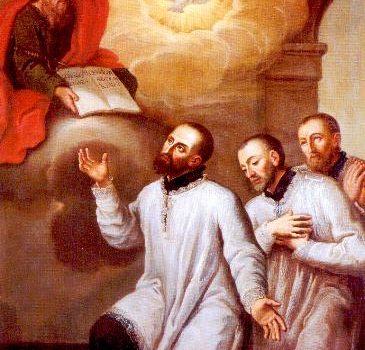
 St. Anthony Mary Zaccaria was born in Cremona, Italy, in 1502. His father died while Anthony was an infant, leaving his education and upbringing to his young mother, a widow at 18. By age 22, Anthony completed his studies in Padua earning a medical doctorate. However, the medical practice was not to be his calling. He was instead called to heal souls. Anthony received Holy Orders in 1528, and worked with the poor and the sick. He was also a spiritual director and reformer. As a contemporary of Martin Luther, his reformations instead focused to build up the Body of Christ rather than to cause division and strife.
St. Anthony Mary Zaccaria was born in Cremona, Italy, in 1502. His father died while Anthony was an infant, leaving his education and upbringing to his young mother, a widow at 18. By age 22, Anthony completed his studies in Padua earning a medical doctorate. However, the medical practice was not to be his calling. He was instead called to heal souls. Anthony received Holy Orders in 1528, and worked with the poor and the sick. He was also a spiritual director and reformer. As a contemporary of Martin Luther, his reformations instead focused to build up the Body of Christ rather than to cause division and strife.
One means to reform was his founding of the Clerks Regular of St. Paul, commonly known as the Barnabites. This Religious Order was the first named after Paul the Apostle. Through his order, St. Anthony promoted a reformation program involving the combined strengths and experiences of Priests — The Clerics Regular of St. Paul, Uncloistered nuns — The Angelics of St. Paul, and Married people — The Marrieds of St. Paul (laity). Though the Laity of St. Paul diminished after St. Anthony’s death, the order experienced resurgence in the 1990s.
St. Anthony’s reforms included special devotion to the Eucharist and Christ Crucified. According to the Barnabite’s website ,
To promote devotion to Christ Crucified Anthony Mary instituted the practice of the tolling of church bells at 3 p.m. every Friday in remembrance of Christ’s death on the cross.
He also advised people to make the cross of Christ the object of constant meditation, reflecting often on “the book that records the sweet memory of the cross of Christ ” (Letter XI ).
Anthony Mary promoted devotion to the Eucharistic Christ in the form of the Forty Hours devotion, public and solemn adoration of the Blessed Sacrament by turn in various city churches, which he first celebrated in Milan in 1537. He also promoted frequent Holy Communion.
Severe voluntary penances and continual labors of charity took their toll, and St. Anthony died at age 37. His body was found incorrupt 27 years after his death in 1539; however, due to changes in the canonization process, his solemn canonization was delayed until 1897 when Pope Leo XIII canonized him in St. Peter’s in Rome.
Lessons
Like St. Francis of Assisi, St. Anthony Mary Zaccaria recognized the importance and ability of all people, religious and laity, to build up the Body of Christ. Let each of us strive to follow Christ, like St. Paul, St. Barnabas, and St. Anthony Mary Zaccaria, while recognizing our need for continual reform and renewal.
Other Saints We Remember Today
St. Anthanasius the Anthonite (1003), Abbot










